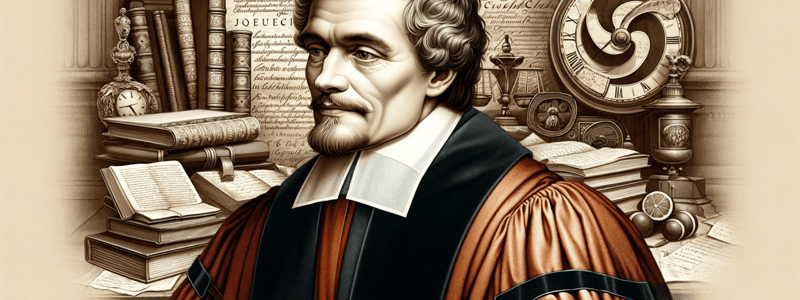Podcast
Questions and Answers
The dogmaticians considered the properties of Scripture, such as inerrancy, authority, sufficiency, clarity, and efficacy, as independent characteristics, not directly linked to its divine inspiration.
The dogmaticians considered the properties of Scripture, such as inerrancy, authority, sufficiency, clarity, and efficacy, as independent characteristics, not directly linked to its divine inspiration.
According to the dogmaticians, the inerrancy of Scripture is limited to its doctrinal content and does not extend to historical, chronological, or other non-doctrinal elements.
According to the dogmaticians, the inerrancy of Scripture is limited to its doctrinal content and does not extend to historical, chronological, or other non-doctrinal elements.
The dogmaticians believed that the prophets and apostles could err in their personal lives but were infallible when writing Scripture.
The dogmaticians believed that the prophets and apostles could err in their personal lives but were infallible when writing Scripture.
The doctrine of inerrancy, as taught by the dogmaticians, applied to both the original texts and all subsequent copies and translations of the Bible.
The doctrine of inerrancy, as taught by the dogmaticians, applied to both the original texts and all subsequent copies and translations of the Bible.
The dogmaticians argued that the inerrancy of Scripture was a logical consequence of its divine inspiration, which in turn was proved by the principle of sola scriptura.
The dogmaticians argued that the inerrancy of Scripture was a logical consequence of its divine inspiration, which in turn was proved by the principle of sola scriptura.
The dogmaticians acknowledged that there were contradictions and inconsistencies in Scripture but regarded these as part of its divine mystery.
The dogmaticians acknowledged that there were contradictions and inconsistencies in Scripture but regarded these as part of its divine mystery.
Albert Pighius and Erasmus are cited as opponents of the Lutheran doctrine of inerrancy, with Pighius asserting that the evangelists could forget or prevaricate in their writings.
Albert Pighius and Erasmus are cited as opponents of the Lutheran doctrine of inerrancy, with Pighius asserting that the evangelists could forget or prevaricate in their writings.
The dogmaticians regarded the New Testament as less important than the Old Testament in terms of being the foundation of Christian faith.
The dogmaticians regarded the New Testament as less important than the Old Testament in terms of being the foundation of Christian faith.
According to the dogmaticians, the apostles and prophets were devoid of any human influence or contribution in their writings, serving merely as passive conduits for divine dictation.
According to the dogmaticians, the apostles and prophets were devoid of any human influence or contribution in their writings, serving merely as passive conduits for divine dictation.
The dogmaticians argued against the view that the Holy Spirit accommodated Himself to common errors and misconceptions of the day in inspiring Scripture.
The dogmaticians argued against the view that the Holy Spirit accommodated Himself to common errors and misconceptions of the day in inspiring Scripture.




